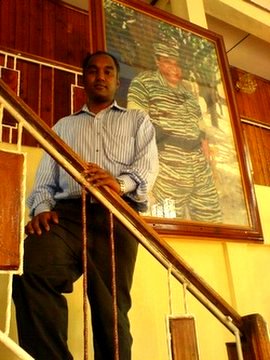.jpg)
Thursday, March 29, 2007
The Cricket World Cup, Book Makers and Match Fixing
The cricket world cup has brought back illegal book makers and allegations of match fixing to the fore. 27 people involved in betting on the India-Sri Lanka match were arrested by the Mumbai police early last Saturday.
The accused were brought to this Mumbai court after their arrest. Their appeal for bail was denied and they were sent to jail.
With the ongoing investigations in the alleged murder of Pakistan cricket coach Bob Woolmer hogging international headlines, the court was full of news cameramen.
Just a block away, children were playing a game of cricket, oblivious to the controversy.
.jpg)
.jpg)
The accused were brought to this Mumbai court after their arrest. Their appeal for bail was denied and they were sent to jail.
With the ongoing investigations in the alleged murder of Pakistan cricket coach Bob Woolmer hogging international headlines, the court was full of news cameramen.
Just a block away, children were playing a game of cricket, oblivious to the controversy.
.jpg)
.jpg)
Nick Porter with the Cow dung Ladies in Delhi

Millions of women in India begin every day spending hours collecting cow dung and then patting bits of it into flat cakes before leaving it to dry in the sun.
The dry cow dung cakes are used as solid fuel to cook in indoor stoves.
These stoves spew a number of hazardous gases like Carbon monoxide, the leading cause of Tuberculosis, Lung cancer a variety of respiratory diseases.
It is estimated that about 800,000 people die every year in south Asia from the use of these indoor stoves.
Nick Porter shoots with these women from a village just outside Delhi as they scoop out bits of maggot infested cow dung and pat them into flat cakes.
Thursday, March 22, 2007
Landing on Indian Shores
.jpg)
.jpg)
About 20,000 Tamil refugees have arrived in Tamil Nadu, India over the last one year. This is the period which has seen renewed fierce fighting in the North and East of Sri Lanka.
Over 140,000 people have been internally displaced in Sri Lanka in just the past three months. Most of the them in the eastern district of Batticaloa.
This group of 21 refugees are relieved as they arrive in India.
" There is heavy deployment of the Indian and Sri Lankan navies. We were scared all the time we where on the boat. We could have been shot by the Sri Lankan Navy or turned back by the Indian Navy. The sea was rough...we could have just fallen off the boat. I am relieved my family is safe." Kanan a fisherman from Trincomalee district tells me after he arrived.
The youngest in the group is just 43 days old. A day before another group came in with a 3 day old baby.
" Things are desperate in Sri Lanka for Tamil civilians. I am a fisherman, the Navy has not allowed me to fish for 8 months. I have had no work for 8 months. We had to sell all all we had to buy food. The government has failed to ensure adequate supplies of food and essentials to Jaffna. Rice is selling for 200 rupees a kilo, sugar is 200 rupees a kilo. To top it all armed groups in while vans without registration numbers pick up Tamil civilians at random. We all live in fear, it is no wonder people are selling all they have to get here and they are making this dangerous journey with women and very young children." another refugee told me.
Tamil Refugees at the Rameshwaram Police Station
.jpg)
.jpg)
.jpg)
This group of Tamil refugees from Sri Lanka arrived after a 7 hour ride on the choppy waters of the gulf of Mannar in a fiber glass speed boat. Most of them had no money...everything they owned was sold to pay for the risky journey.
These pictures taken outside the police station show officials of the Tamil Nadu polive "Q" branch recording statements from the refugees before they are taken to the Mandapan transit camp.
Tuesday, March 20, 2007
The Ruins of Dhanushkodi
The district of Dhanushkodi on the southern most tip of India was hit by a Tsunami in 1967. This bustling colonial port town was devastated and thousands of people died. Most of the buildings were destroyed.
Today most of the district is under sea or sand. The population in this sensative boarder district is just a few hundred, mostly Sri Lankan Tamil refugees. Most of them subsist on fishing.
There is an old colonial church built in 1920 and rows of houses built for customs officials in the ruins
.jpg)
Today most of the district is under sea or sand. The population in this sensative boarder district is just a few hundred, mostly Sri Lankan Tamil refugees. Most of them subsist on fishing.
There is an old colonial church built in 1920 and rows of houses built for customs officials in the ruins
.jpg)
Subscribe to:
Posts (Atom)
.jpg)
.jpg)
.jpg)
.jpg)
.jpg)
.jpg)
.jpg)
.jpg)
.jpg)
.jpg)
.jpg)
.jpg)
.jpg)
.jpg)
.jpg)
.jpg)
.jpg)
.jpg)

.jpg)
.jpg)
.jpg)
.jpg)
.jpg)
.jpg)
.jpg)
.jpg)
.jpg)
.jpg)
.jpg)
.jpg)
.jpg)
.jpg)
.jpg)
.jpg)
.jpg)
.jpg)
.jpg)
.jpg)
.jpg)
.jpg)
.jpg)

